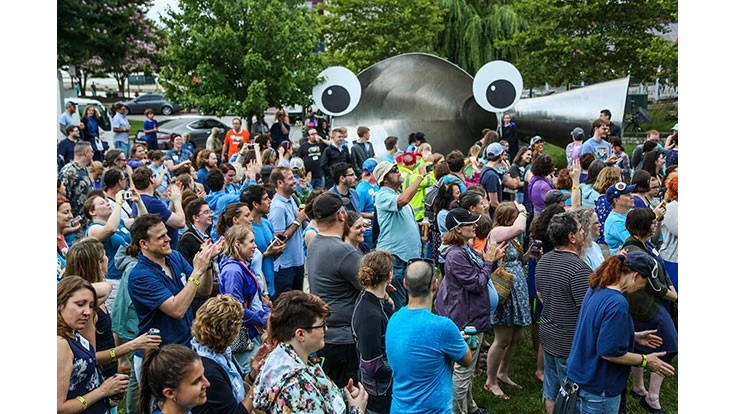
Coca-Cola Great Britain has announced Sprite bottles will switch from green plastic to clear plastic to enable bottle-to-bottle recycling, effective September 2019. Sprite also will increase the amount of recycled polyethylene terephthalate (rPET) in all bottles by 50 percent in 2020.
“Using more recycled plastic is a critical element of our sustainable packaging strategy, as it reduces the amount of virgin material used in our packs,” says Jon Woods, general manager,
Coca-Cola Great Britain, in partnership with
“Our new Smartwater bottle shows we can go further, but that requires more packaging to be collected so that more can be reused to make new bottles,” Woods says. “That’s why we support the planned reforms of the current recycling system in Great Britain and are calling for the introduction of a well-designed deposit-return scheme for drinks containers, which we believe will reduce litter and increase the quantity and quality of material reprocessed in this country.”
McDonald’s removes plastic lids, single-use plastics from U.K. menu
McDonald’s U.K. will remove plastic lids from all McFlurry options in September and all single-use plastic packaging for salads will be replaced with “carton board,” which contains 50 percent recycled content.
In total, the removal of plastic lids and single-use plastic salad containers will reduce plastic use by 485 tons per year, the fast food company says in a news release announcing the change.
Salads will be served in 100 percent renewable and recyclable cardboard containers. The coating on the containers, designed to keep them rigid, is also 100 percent renewable, according to the company.
“It’s the latest step in our sustainability journey,” says Beth Hart, supply chain director, McDonald’s U.K. & Ireland. “We are committed to listening to our customers and finding solutions with our suppliers that work for them. This is the latest example of that, but by no means the end.”
In 2018, McDonald’s U.K. announced that it would replace more than 8 billion plastic straws per year with paper straws. The U.K. business operates more than 1,270 restaurants, serving more than 3.7 million customers per day. The changes are part of an “ongoing commitment” to move to more sustainable packaging. Globally, McDonald’s has committed to source all packaging from renewable or recycled sources by 2025.
“We continue to look for solutions for our cutlery and lids, but this is great progress,” Hart says.
PepsiCo advances recycled plastic packaging
PepsiCo Inc., Purchase, New York, has announced that LIFEWTR will be packaged in 100 percent rPET and bubly sparkling water will no longer be packaged in plastic. The company's Aquafina water brand also will offer aluminum can packaging in the United States, while the brand tests the move.
"We are really excited to evolve our packaging across PepsiCo's water portfolio to make a positive impact," says Stacy Taffet, vice president water portfolio for PepsiCo. "We created LIFEWTR to be an inspirational and purpose-driven brand, and we're expanding that vision by using recycled packaging to deliver our premium water.”
The changes, which all go into effect 2020, are expected to eliminate more than 8,000 tons of virgin plastic and approximately 11,000 tons of greenhouse gas emissions, representing the latest steps in the company's sustainability journey and pursuit of a circular economy for plastics, PepsiCo says in a news release.
The company’s 2025 goals include 100 percent recyclable, compostable or biodegradable packaging and 25 percent recycled plastic content in all plastic packaging.
PepsiCo says it’s working with current suppliers and partners, including The Recycling Partnership, Falls Church, Virginia; Loop Industries, Montreal; the Alliance to End Plastic Waste; and the World Economic Forum's Global Plastic Action Partnership (GPAP) to help increase the supply needed to meet its packaging goals.
"Tackling plastic waste is one of my top priorities and I take this challenge personally," says PepsiCo Chairman and CEO Ramon Laguarta. "We recognize the significant role PepsiCo can play in helping to change the way society makes, uses and disposes of plastics."
Order of the Wheel inducts new members
Waterfront Partnership’s Healthy Harbor initiative, which operates the Inner Harbor Water Wheel and provides a road map to clean Baltimore’s harbor of plastics, recently inducted more than 100 community members into the Order of the Wheel, a “secret” society launched in 2018 to carry out environmental action against plastic pollution.
Inductees formally committed to advancing the Inner Harbor Water Wheel project’s mission to rid the world’s waterways and oceans of single-use plastics. To qualify, pledges had to complete five tasks, demonstrating their commitment to a “clean, waste-free environment.”
More than 700 people participated in the second pledge period for the Order of the Wheel, with 155 completing all tasks. More than 30 members were also promoted to “Master Wheelers.”
Order of the Wheel launched with 400 inductees, with a goal of spreading grassroots environmental action against waste pollution. The society was inspired by the thousands of “Mr. Trash Wheel” fans and their dedication to a plastic-free harbor.
Latest from Recycling Today
- BMW Group, Encory launch 'direct recycling’ of batteries
- Loom Carbon, RTI International partner to scale textile recycling technology
- Goodwill Industries of West Michigan, American Glass Mosaics partner to divert glass from landfill
- CARI forms federal advocacy partnership
- Monthly packaging papers shipments down in November
- STEEL Act aims to enhance trade enforcement to prevent dumping of steel in the US
- San Francisco schools introduce compostable lunch trays
- Aduro graduates from Shell GameChanger program





